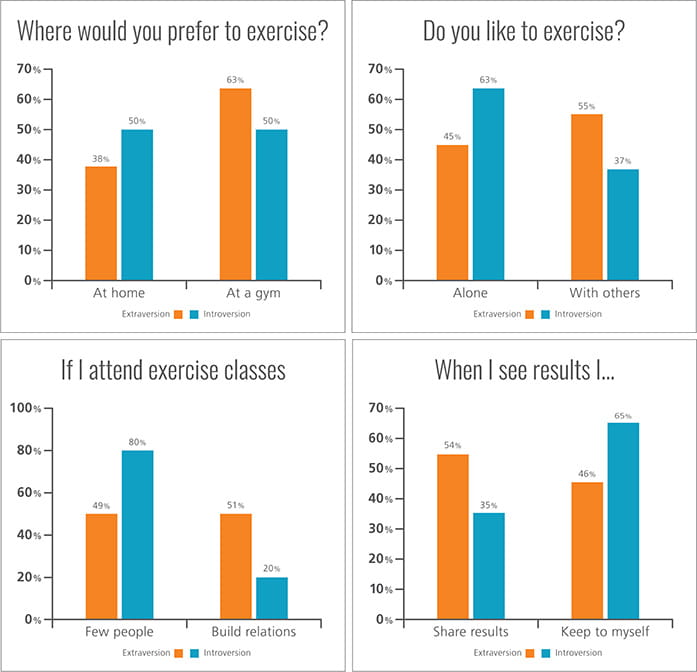Does knowing your MBTI type help you to get fit?
John Hackston, Head of Thought Leadership, OPP
Did you make a New Year resolution to lose weight and get fitter?
If so, did you know that how well you stick to your fitness regime will depend in part on your MBTI personality type, and on choosing the right conditions in which to exercise?
This is the message from research by Rich Thompson and his colleagues at CPP, Inc., which we presented at the British Psychological Society Division of Occupational Psychology conference on the 11 January 1.
In the research, 794 people who knew their MBTI best-fit type completed an online survey that included questions on how often they exercised, their exercise preferences, and how satisfied they were in their job.
MBTI type and exercise
Our findings showed that people’s personality types did relate to the way they preferred to exercise. For example:
- Extraverts prefer exercising at a gym rather than at home, often with other people. Many attend the same classes regularly so that they can develop relationships. Most also enjoy sharing their exercise achievements with others. Introverts are ambivalent about exercising in the gym or at home, but prefer to exercise alone and interact with few people (especially if they also have preferences for Thinking). In general, they tend to keep their exercise achievements to themselves.

- If people exercise by walking or cycling, most prefer to take a variety of routes; however, those with preferences for Intuition or Perceiving really do dislike taking the same route.
- People with a preference for Thinking will generally choose a fitness instructor based on their qualifications or experience; those with a preference for Feeling are more likely to make this choice based on their relationship with the instructor.
So it seems that knowing your MBTI type can help you choose a form of exercise that you are more likely to enjoy – or at least persevere with.
MBTI type, fitness and the workplace
Of course, it’s not just individuals who benefit from exercise. Organisations with a fitter workforce have lower levels of illness-related absence 2 3 and higher levels of job satisfaction and productivity 4. However, even when organisations promote the benefits of exercise programmes, many people maintain a sedentary lifestyle. Others will begin a programme but then stop within the first six months 5, so organisations should consider helping employees to take a route that suits them, rather than adopting a ‘one size fits all’ approach. An awareness of your psychological type is not a panacea; just knowing your MBTI type will not magically make you fit. But choosing exercise that works with who you are can certainly make things easier, and that’s good news both for individuals and organisations.
1 Thompson, R.C. & Hackston, J. (2018). Personality, exercise, job satisfaction and turnover intention: Are they related? Poster presented at the BPS DOP annual conference, Stratford-upon-Avon, Jan 2018.
2 Lechner, L, & de Vries, H. (1997). Effects of an employee fitness program on reduced absenteeism. Journal of Occupational & Environmental Medicine, 39(9), 827-831.
3 Jacobson, B.H., & Aldana, S.G. (2001). Relationship between frequency of aerobic activity and illness-related absenteeism in a large employee sample. Journal of Occupational & Environmental Medicine, 43(12), 1012-1025
4 Wattles, M. G., & Harris, C. (2003). The relationship between fitness levels and employee’s perceived productivity, job satisfaction, and absenteeism. Journal of Exercise Physiology, 6(1), 24-32.
5 Robison, J., & Rogers, M.A. (1994). Adherence to exercise programmes. Sports Medicine, 17(1), 39-52.
Related blogs